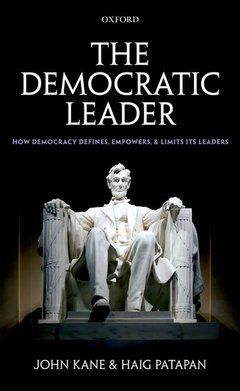Description
The Democratic Leader
How Democracy Defines, Empowers and Limits its Leaders
Authors: Kane John, Patapan Haig
Language: English
Subject for The Democratic Leader:
Publication date: 03-2012
218 p. · 14.1x22.1 cm · Hardback
218 p. · 14.1x22.1 cm · Hardback
Description
/li>Contents
/li>Biography
/li>
The Democratic Leader argues that leaders occupy a unique place in democracies. The foundational principle of democracy -- popular sovereignty -- implies that the people must rule. Yet the people can rule only by granting a trust of authority to individual leaders. This produces a tension that results in a unique type of leadership, specifically, democratic leadership. Democratic leaders, once they have the confidence and authority of the people, are very powerful because they rule through consent and not through fear. Yet in many respects they are the weakest of leaders, because democrats distrust leaders and impose on them a range of far-reaching constraints--legal, moral and political. The democratic leader must perpetually navigate the powerful and contending forces of public cynicism, founded in the suspicion that all leaders are self-interested power-seekers, and of public idealism, founded in a perennial hope that good leaders will act nobly by sacrificing themselves for the people. The Democratic Leader suggests that the inherent difficulty of this form of leadership cannot be resolved, and indeed is necessary for securing the strength and stability of democracy.
Acknowledgments. 1. Introduction. 2. The Neglected Problem of Democratic Leadership. 3. Democratic Leadership and the Problem of Legitimacy. 4. The Moral Dilemma of Democratic Leadership. 5. Leadership and Democratic Rhetoric. 6. Leadership in a Constitutional Democracy. 7. The Bureaucratic Challenge to Democratic Leadership. 8. Democratic Leadership in Foreign Affairs. 9. Honour and Democratic Leadership 144. 10. Conclusion. References. Index.
Patapan's research interests are in democratic theory and practice, political philosophy, political leadership, and comparative constitutionalism. He is a Professor in the Department of Politics and Public Policy, Griffith University, Australia. John and Haig were awarded the Australian Political Studies Association's Mayer Journal Article Prize for the paper judged to be the best published in the Australian Journal of Political Science in 2010. The award was given to the article, 'The Artless Art: Leadership and the Limits of Democratic Rhetoric' (45:3) which was drawn from a chapter in The Democratic Leader.
© 2024 LAVOISIER S.A.S.



